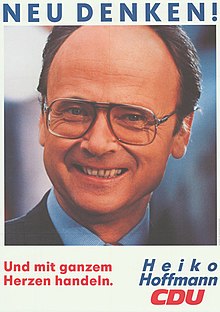State election in Schleswig-Holstein in 1988
- SPD : 46
- Week of pregnancy : 1
- CDU : 27
The state elections in Schleswig-Holstein in 1988 on May 8, was an early election , the result of the in the previous state elections on Sept. 13, 1987 resulting stalemate and also due to the Barschel affair was decided.
Previous state election
In the state elections on September 13, 1987, the CDU under Prime Minister Uwe Barschel lost the absolute majority it had held since 1971 with 42.6 percent of the votes and a loss of 6.4 percentage points and was behind the SPD for the first time since the state elections in 1958 , which received 45.2 percent of the vote under its top candidate Björn Engholm .
Together with the FDP (4 seats) that had returned to the state parliament , the CDU held 37 of the 74 state parliament seats. In contrast, there were 36 MPs from the SPD and the SSW MP , Karl Otto Meyer .
The formation of a government was made more difficult by the affair of Prime Minister Uwe Barschel , who resigned on October 2, 1987 and died in Geneva on the night of October 10 to 11, 1987 under circumstances that have not yet been clarified .
Because of the Barschel affair, Meyer refused to vote for a CDU candidate, thus clearing the way for new elections.
Election campaign
The election was influenced by the results of the committee of inquiry into the machinations that were launched by the State Chancellery against the SPD top candidate Engholm. According to what was known at the time, a large part of the partly illegal machinations were due to Uwe Barschel.
The former Justice Minister Heiko Hoffmann and again the SPD's top candidate Björn Engholm applied for the Prime Minister's office, which has been held by Interior Minister Henning Schwarz since Barschel's resignation .
Result
Eligible voters: 2,041,062
Voters: 1,580,465 (turnout: 77.43%)
Valid votes: 1,566,837
| Political party | be right | Share in% |
Direct MAN date |
Seats |
|---|---|---|---|---|
| SPD | 857.956 | 54.76 | 44 | 46 |
| CDU | 521.264 | 33.27 | 27 | |
| FDP | 69,620 | 4.44 | ||
| GREEN | 44,898 | 2.87 | ||
| SSW | 26,643 | 1.70 | 1 | |
| NPD | 19,154 | 1.22 | ||
| UWSH | 12,791 | 0.82 | ||
| REP | 8,673 | 0.55 | ||
| DKP | 2,253 | 0.14 | ||
| SHP | 2,245 | 0.14 | ||
| ÖDP | 1,170 | 0.07 | ||
| FSU | 170 | 0.01 | ||
| Total | 1,566,837 | 44 | 74 |
The SPD experienced its greatest success to date in Schleswig-Holstein: it gained 9.6 percentage points and achieved an absolute majority in the state parliament with 54.8 percent of the votes cast. It also managed for the first time to win all of the state electoral districts directly in a state election in Schleswig-Holstein.
In contrast, the CDU suffered severe losses of 9.3 percentage points and achieved its worst result since 1954 with 33.3 percent of the vote .
The FDP, which returned to the state parliament in 1987 with 5.2 percent of the vote, missed this time with 4.4 percent of the vote. The Greens , never represented in the state parliament, dropped from 3.9 to 2.9 percent of the vote.
Only the SSW, as a party of the Danish minority exempted from the threshold clause, was able to continue to send a representative, again MP Meyer, to the state parliament with 1.7 percent of the votes.
result
Due to the fact that the SPD was able to form a sole government , Björn Engholm was elected on May 31, 1988 as the first Social Democratic Prime Minister of Schleswig-Holstein since 1950. The CDU went into the opposition for the first time after 38 years of government responsibility.
See also
Web links
Individual evidence
- ↑ Eligible voters, voters and distribution of votes in% (PDF), Statistical Office for Hamburg and Schleswig-Holstein.

